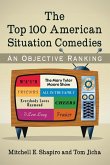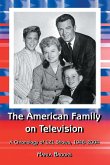Once the major Hollywood studios got over their loathing of television as an entertainment medium, they moved quickly to try to dominate both domestic and international programming. In the United States, the eight major studios controlled an overwhelming majority of all television programming by the early 1950s. Their efforts in foreign markets were not quite so successful, but by the 1990s U.S. distributors controlled about 75 percent of the international television trade. Hollywood's efforts in television were often thwarted by governments that recognized the airwaves as a public resource and intervened in varying degrees to keep the studios' programing off the air in their countries. Still the U.S. industry found various ways to provide American fare to foreign viewers. Even into the 1980s, for example, some Hollywood shows could be bought by foreign broadcasters for fees as low as $25 per segment. Despite these efforts the American studios have never been able to completely dominate foreign airwaves: Viewers usually prefer their own, domestic fare to that offered by Hollywood. This history fully documents the U.S. television industry's efforts in foreign markets and how it continues to look for new markets.
Hinweis: Dieser Artikel kann nur an eine deutsche Lieferadresse ausgeliefert werden.
Hinweis: Dieser Artikel kann nur an eine deutsche Lieferadresse ausgeliefert werden.








